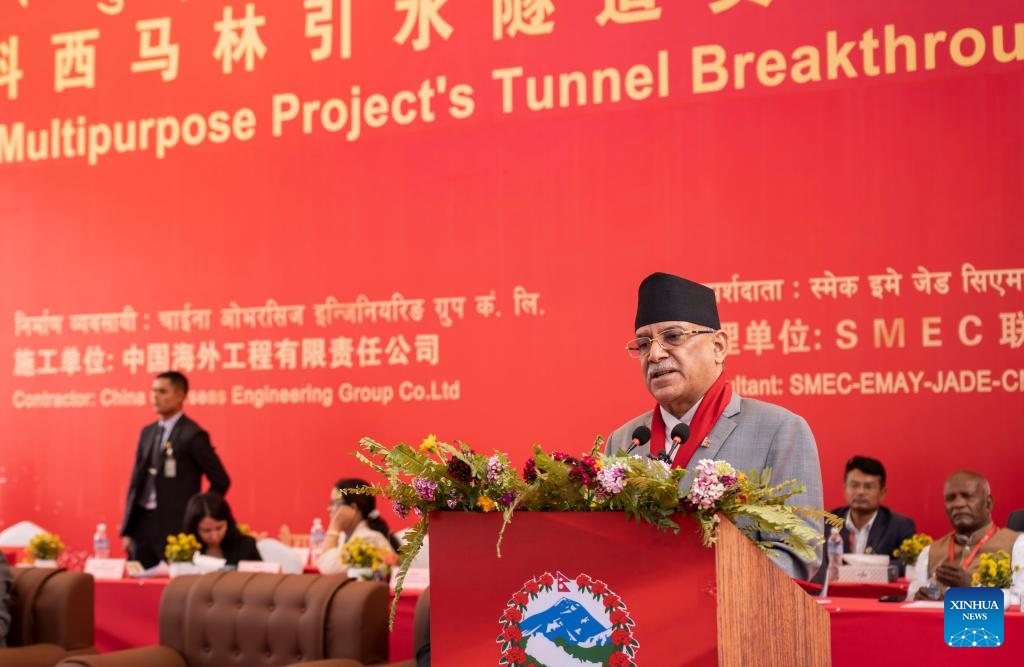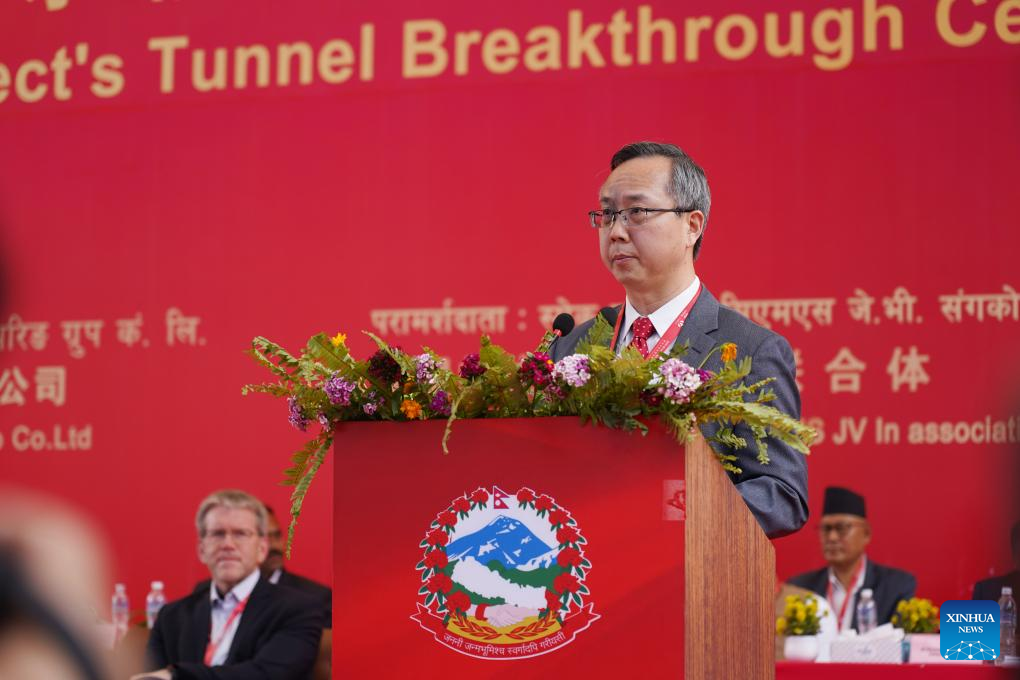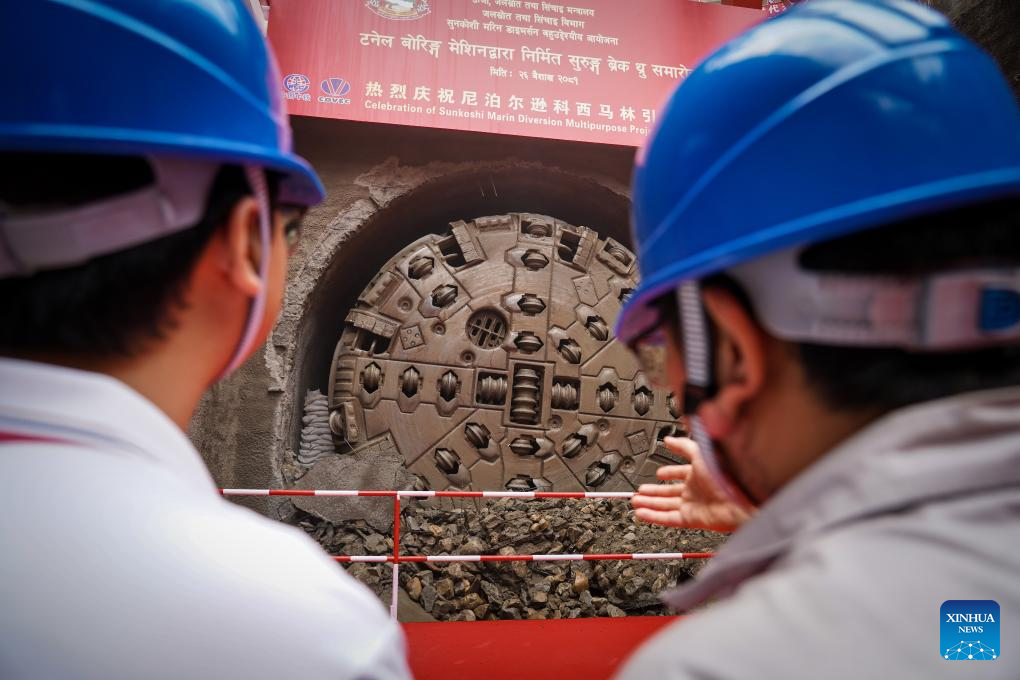
Nepal has made new progress on various fronts in regard to its ties with China, including in infrastructure building and community development projects.
In a major engineering project, a 13.3-km-long tunnel under Nepal's Sunkoshi Marin diversion multipurpose project, contracted by China Overseas Engineering Group Co and constructed by China Railway Erju Co, was successfully completed in the past week, 12 months ahead of schedule.
On May 8, a grand ceremony, attended by Nepali Prime Minister Pushpa Kamal Dahal, Chinese Ambassador to Nepal Chen Song, and the United States Ambassador to Nepal Dean R. Thompson, among other dignitaries, was held in Sindhuli district of Nepal, where the project is situated, to celebrate its success.
After the Nepali prime minister pushed a button, a double-shield tunnel boring machine broke through the last section of the tunnel within minutes, to applause from the audience.
Dahal hailed it as a "transformative national pride project" contributing to the country's national economy, productivity and prosperity.
Chinese enterprises … contributed Chinese wisdom and Chinese solutions, and cooperated with the technical personnel from Nepal to overcome all the difficulties such as geological conditions, logistics problems and long period of monsoon time, but finished the project 12 months ahead of schedule, which shows the Chinese speed with high quality and high standards.
Chen Song, Chinese Ambassador to Nepal
The construction of the tunnel started on Aug 26, 2021, with the Chinese companies breaking world records in terms of tunneling speeds.
Chen, the Chinese ambassador, said, "Chinese enterprises … contributed Chinese wisdom and Chinese solutions, and cooperated with the technical personnel from Nepal to overcome all the difficulties such as geological conditions, logistics problems and long period of monsoon time, but finished the project 12 months ahead of schedule, which shows the Chinese speed with high quality and high standards."
The project is aimed at diverting water from the Sunkoshi River to the Marin River through the tunnel to irrigate 122,000 hectares of farmland in the districts of Dhanusha, Mahottari, Sarlahi, Rauthat and Bara in the Terai Plains.
ALSO READ: China, Nepal to promote Belt and Road cooperation
In addition, a powerhouse is being built to generate 28.62 megawatts of electricity to alleviate the shortage of power supply in the area.
Dahal noted that while agriculture contributes to one third of Nepal's gross domestic product, there is not enough water flow in winter and spring in the Terai region which has 60 percent of the nation’s arable land.
He voiced belief that the project will not just support the country's economy, it will also help reduce trade imbalance stemming from food imports. "I also believe that the project will support skill and technology transfer, and enhance the capacity of our institutions," the prime minister said.

In terms of assistance, the China Rural Development Foundation (CRDF) and the United Nations Development Programme (UNDP) are working together to support schools and communities in Nepal’s Madhesh Province.
As part of the assistance, on May 8, a city in the Sarlahi region launched a special project to support schools and communities in remote areas for pandemic prevention and green recovery. The project will support 25 public schools in two counties, benefiting 15,000 students and 7,500 families.
In a speech, Ram Saroj Yadav, minister for physical infrastructure development of Madhesh Province, said that he was very grateful to China for choosing the province and establishing a new demonstration project in the region.
Yadav said that China is developing large-scale development projects, which are of great significance to Nepal's development and prosperity.

Chinese envoy Chen said the project will create a safe and healthy learning environment for students and communities to withstand extreme weather events, disasters and extreme shocks. He also announced the implementation of two major projects, "Clean Drinking Water" and "Lighting up Villages", starting in the Madhesh province.
Julien Chevillard, deputy resident representative for UNDP Nepal, said investment in education and green recovery is essential to address the impacts of climate change and achieve the UN Sustainable Development Goals. The special project in Nepal is being implemented by the CRDF.
READ MORE: China and Nepal embrace new era of friendship
Wu Peng, director of the CRDF’s Department of International Development, said that the organization has supported more than 60 districts in seven provinces across Nepal, directly benefiting more than 500,000 people.
"We hope that by working together, we can help communities recover from the pandemic and disasters and help the Nepalese public live a better life," Wu said.
The latest projects will provide schools with essential equipment and items such as desks and bookshelves to improve the learning environment, and necessities such as mats and improved stoves for the community.
Xinhua contributed to the story.


